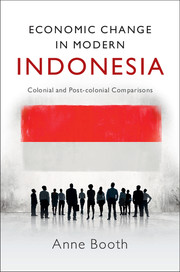Book contents
- Frontmatter
- Contents
- List of tables
- Acknowledgements
- 1 Introduction: Indonesia's three watersheds
- 2 The colonial legacy
- 3 Occupation, liberation and the challenges facing the new republic, 1942–66
- 4 Suharto's economic record: successes and failures
- 5 The 1997–98 crisis and its legacy: dropping out again?
- 6 The SBY years: building a new Indonesia?
- 7 Economic nationalism, economic rationalism and the development of private business after 1950
- 8 Trends in poverty and income distribution: the Suharto era and beyond
- 9 The changing role of government from the colonial era to the post-Suharto years
- 10 Conclusions
- Bibliography
- Index
4 - Suharto's economic record: successes and failures
Published online by Cambridge University Press: 05 February 2016
- Frontmatter
- Contents
- List of tables
- Acknowledgements
- 1 Introduction: Indonesia's three watersheds
- 2 The colonial legacy
- 3 Occupation, liberation and the challenges facing the new republic, 1942–66
- 4 Suharto's economic record: successes and failures
- 5 The 1997–98 crisis and its legacy: dropping out again?
- 6 The SBY years: building a new Indonesia?
- 7 Economic nationalism, economic rationalism and the development of private business after 1950
- 8 Trends in poverty and income distribution: the Suharto era and beyond
- 9 The changing role of government from the colonial era to the post-Suharto years
- 10 Conclusions
- Bibliography
- Index
Summary
Challenges facing Suharto's New Order
By the mid-1960s, most economists were painting a dismal picture of the Indonesian economy. In one of the most widely read textbooks of the decade, Higgins characterised Indonesia as the ‘chronic dropout’ and claimed that the country ‘must surely be accounted the number one economic failure among the major underdeveloped countries’. He pointed out that all the available evidence pointed to prolonged stagnation throughout the colonial era, the Japanese occupation and the first two decades of independence and argued that such stagnation
in the form of virtually constant levels of per capita income or an unchanging structure of employment and production or both- is certainly not unknown among underdeveloped countries; but the Indonesian experience, in which a whole series of concepts of economic organisation, first in a colony and then in an independent nation, failed to bring significant or lasting improvements in levels of living at any time, seems to be unique. (Higgins 1968: 678)
At the time these words were written, few expected that there would be any dramatic improvement in Indonesia's economic fortunes. In September 1965 an attempted coup resulted in the murder in Jakarta of six senior generals. This provided an excuse for the military to begin to purge members of the Communist Party and ultimately Sukarno himself. In March 1966, the hitherto obscure Lieutenant-General Suharto together with the former diplomat Adam Malik and the Sultan of Yogyakarta assumed effective power. The new regime was backed by most of the army and also had the support of many groups within the intelligentsia, the student body and the Islamic community. Its anti-communist complexion guaranteed the new government considerable support from major Western bilateral and multilateral donors, support which had been spurned by Sukarno. But Indonesia's ‘New Order’ faced daunting tasks in rehabilitating the economy.
Per capita GDP in 1967 was lower, in real terms, than in 1941, and lower than in many other Asian and African countries (Table 4.1). Gross domestic capital formation had sunk to 6 per cent of GDP in 1962, and remained at below 10 per cent until 1968 (CBS 1970: 47). The failure to invest was evident not just in the absence of new infrastructure and productive enterprises, but also in the poor condition of existing factories, roads, railways, electricity generation facilities, ports, airports, irrigation systems and so on.
- Type
- Chapter
- Information
- Economic Change in Modern IndonesiaColonial and Post-colonial Comparisons, pp. 63 - 88Publisher: Cambridge University PressPrint publication year: 2016

